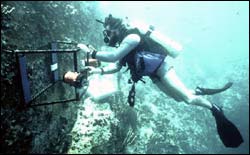For the first time, the public will have the extraordinary opportunity to observe live brain surgery in a pioneering event at the Science Museum’s Dana Centre in London, on Thursday 28 October.
Broadcast for the first time to a UK audience, visitors to the Dana Centre will not only watch live surgery, but be able to direct questions to the surgical team in the USA whilst the operation takes place. Live from Brainworks will be broadcast across the Atlantic Ocean from Overlook Hosp
Earthquakes can be triggered by the Earth’s tides, UCLA scientists confirmed Oct. 21 in Science Express, the online journal of Science. Earth tides are produced by the gravitational pull of the moon and the sun on the Earth, causing the ocean’s waters to slosh, which in turn raise and lower stress on faults roughly twice a day. Scientists have wondered about the effects of Earth tides for more than 100 years. (The research will be published in the print version of Science in November.
The mechanisms behind rock-weathering processes can provide vital clues for understanding and reconstructing the history of ancient environments and visualizing the physical conditions in which they were formed, especially climatic situations. Thick ancient coverings of weathered material such as laterites are still the most intensively studied to date. However, little is known about the initial stages of weathering, owing to the rare occurrence of well-preserved examples.
As a c
UK scientists and industrialists involved in the NASA, ESA, ASI Cassini-Huygens space mission are eagerly awaiting the data to be received when the spacecraft makes its closest fly-by of Saturn’s largest moon, Titan, on 26th October.
At the time of the closest approach, which is scheduled to be at 5.44 pm BST (9.44 am PDT), the spacecraft will travel a mere 1200km (745 miles) above the surface of the moon at a speed of 6.1 km per second. Confirmation that the flyby has been suc

In an epic research project spanning 14 years and seven continents, a research team based at Brown University has photographed and cataloged nearly 3,000 species of sponges, corals and other shallow water ocean invertebrates from Antarctica to Australia. The key finding: Large-scale forces play a pivotal role in local species diversity. Results are published in the current online early edition of the Proceedings of the National Academy of Sciences.
In a groundbreaking, globetr
Antarctica and climate change – representatives of 32 nations decide on research focus programmes for the exploration of Antarctica
Exploration of Antarctica is of great significance in the context of discussions about global climate change. For this reason, the international Antarctic research community has just re-defined and coordinated its scientific programmes within a recent meeting of the international committee responsible for Antarctic research coordination SCAR (Scient